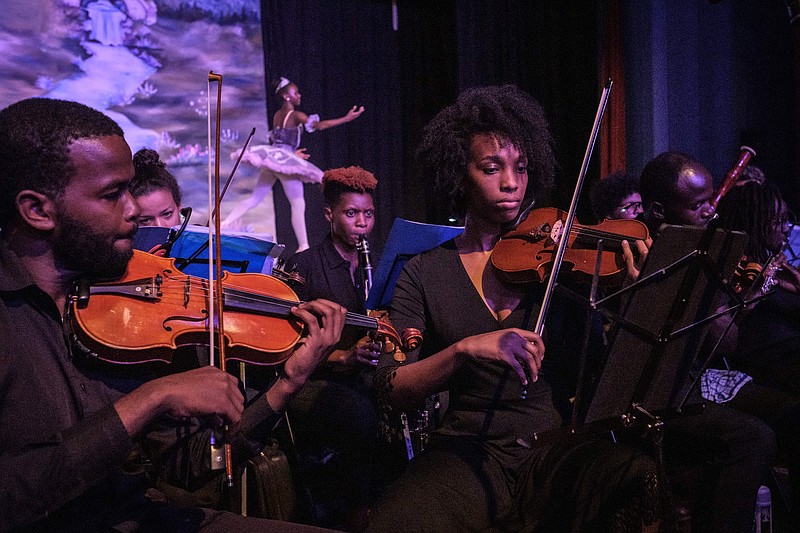It is, for so many of us, the permanent soundtrack of the holiday season.
Pyotr Ilyich Tchaikovsky's ballet "The Nutcracker," like no other music, conjures up images for me of warm fireplaces, whirling snowflakes, brightly wrapped presents, twinkling lights on a fragrant tree.
I've been hooked on "The Nutcracker" score ever since my first performance of the ballet at the age of maybe 6 or 7, sitting in a folding chair at the high school gym as a friend of mine performed to recorded music with her ballet school. Dozens of Nutcrackers later, it's still magic.
Things weren't quite so magical at its beginning. Tchaikovsky, late in his career, began writing the "Nutcracker" ballet — as well as a separate composition combining much of its music, called "The Nutcracker Suite" — in 1891 as a companion piece to a now forgotten one-act opera called "Iolanta." The two works premiered in December 1892 at the Mariinsky Theatre in St. Petersburg, Russia, to lukewarm response. Tchaikovsky died the following year at the age of 53, believing the work to be a failure; it was, according to biographer David Brown, not performed again in Russia until 1919.
And that might have been that, were it not for Willam Christensen, artistic director of the San Francisco Ballet, who single-handedly began the "Nutcracker" tradition in America by presenting the first U.S. production of the ballet in December 1944. According to the San Francisco Ballet, Christensen had never actually seen "The Nutcracker" performed in its entirety before staging it, but was able to obtain a notated score from the Library of Congress, and spoke to George Balanchine about the latter's memories of the ballet in Russia. Balanchine would go on to create his own wildly popular "Nutcracker" for New York City Ballet a decade later, and today you can hear Tchaikovsky's score in a "Nutcracker" production in every city and town in America, from the tiniest ballet schools to the most dazzling professional companies.
And while it's always a joy to hear this work performed live, you don't need to buy a ticket — or even have any interest in ballet — to appreciate the artistry of Tchaikovsky's score. It plays in my head all the time, always beginning with the delicate flicks of the overture (former Pacific Northwest Ballet music director Stewart Kershaw, who conducted around 800 performances of the ballet in his career, told me years ago that he thought of this piece as the opening of a music box, setting the stage), played by the orchestra's lighter instruments, as if reassuring the youngest audience members that all is gentle here.
The music of the party scene, with its playful marches and stately gavotte, is pleasant and lovely, but the real joy of Tchaikovsky's "Nutcracker" doesn't begin until Clara goes to bed. The stage is empty and night has fallen, and the music finds a sense of dark wonder, with little eruptions of notes and a sudden brass crash. And then it begins to grow and grow, like the tree, its notes emerging like gold thread being spun in ever-increasing heaps, and suddenly you're 6 years old again, gazing rapt at a stage transforming before your eyes, hearing the cymbals clash and the strings soar. Brown, in "Tchaikovsky: The Man and His Music," called the tree-growing music simply "one of the most awesome passages Tchaikovsky ever wrote." (I just listened to it again. He's not wrong.)
On we go, into the shadowy playfulness of the battle music, the majestic notes of the pre-Snow pas de deux (Kershaw called it "the great C Major") and the delicious lilting flutes of the Waltz of the Snowflakes, which always sounds to me exactly what a nighttime snowfall feels like, with snowflakes chasing each other in the icy breeze. Act 2 brings a pastiche of musical inspirations for the various international dances (though Brown notes that the Arabian variation, also known as the Peacock, isn't Arabian in the slightest but is based on a Georgian cradle song). And there's another bit of magic: the Dance of the Sugar Plum Fairy, with the delicate bell-like tones of the celesta — then a brand-new instrument whose debut Tchaikovsky plotted in secret, worried that another composer would steal his thunder. It's as if the ballerina is dancing on delicate porcelain, or on fairy wings; a dance of ethereal beauty and weightless joy.
I wish I was enough of a classical music expert to recommend a particular "Nutcracker" recording, but I suspect that if you love this music, the best recording is whichever one is at hand. There's a lovely one currently on YouTube, should you be in need of it, by the Rotterdam Philharmonic — an unusual presentation of just the music of the full ballet, without the dancing. But let me correct myself: There's actually plenty of dancing, in the expressive full-body movements of the conductor who's clearly enjoying letting this glorious music wash over him.
"For the thousands who see it every December, Tchaikovsky has become something like a favorite uncle before Christmas (a little like Drosselmeyer)," wrote David Schroeder in "Experiencing Tchaikovsky: A Listener's Companion," "enchanting us and ushering us into the season like nothing else can." Try listening to it with your eyes closed at some point during this holiday season, and see if you don't suddenly shiver, as if softly pelted by sudden perfect snow.
(Ballet Arkansas' "Nutcracker Spectacular" wraps up a three-day run at 2 p.m. today at the Robinson Center Performance Hall in Little Rock. Its production of "The Nutty Nutcracker" has its final showing at 6 p.m. today. For tickets, see ticketmaster.com.)
